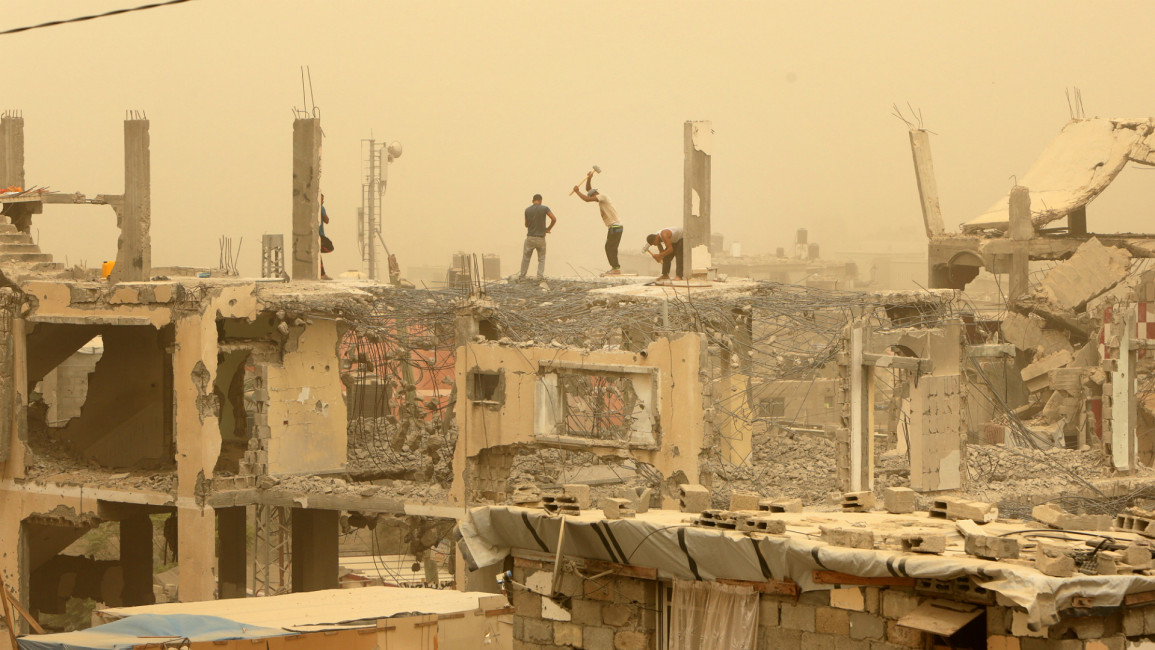
How Israel is deterring reconstruction efforts in Gaza
Nearly two weeks ago, Israel blocked cement entry into Gaza, complicating an already sluggish reconstruction process and consequently delaying the introduction of much needed infrastructure projects.
The ban was not limited to reconstruction efforts, but also included cement that is designated to projects sponsored by the UNRWA. This led to the suspension of work in 46 major projects, including several schools.
Israel invoked security concerns to justify the recent move, alleging that Hamas, the resistance movement that rules the Strip, had diverted cement imports for use in militant activities. Hamas categorically denied the charges.
I had spoken to Mohammed Al-Assar, Secretary of the Palestinian Federation of Construction Industries Union, who explained the events leading up to the Israeli ban.
In late 2015 and early 2016, Israel used to allow entry of an amount of cement that ranged between 1,200 and 1,500 tons per day.
A significant portion of this quantity was allocated for infrastructure projects sponsored by UNRWA, UNDP, Qatar and other donors, while the remaining amount goes to the reconstruction projects.
Al-Assar estimates that an effective reconstruction plan requires an estimated 5,000 tons a day.
Previously, cement prices ranged between 550-600 NIS (New Israeli Shekels) on average, while the official price was set to 520 and, later, raised to 540 NIS.
Some cement vendors profiteered from the disparity between supply and demand, but in general prices remained within an affordable range.
In March, however, the amounts of cement that entered Gaza shrunk significantly due to recurrent interruptions in the opening of the Kerem Shalom crossing, the only access point through which Gaza receives basic needs and material.
Once again, the lives of Gazans had to proceed according to the occupier's rhythm.
 |
Once again, the lives of Gazans had to proceed according to the occupier's rhythm |  |
Shrinking supplies pushed cement prices up, with cement being sold at 700 NIS per ton or more in some cases.
People who have been waiting for over a year and half to receive reconstruction funds that barely covered the expenses had to purchase construction materials at prices 40 percent higher.
At this point, al-Assar says, Gaza’s economy ministry tried to intervene, demanding vendors to supply the ministry with lists of benefactors who bought cement, the quantities the purchased and how much they paid.
Hence, what was publicised by the occupation as an attempt to funnel cement into other uses is in fact nothing more than an attempt by local authorities to control the inflating market.
By the second week of April, a ton of cement reached 3,000 NIS compared to the original price of 540.
By suspending cement imports, Israel is trying to promote greed that it generated through its 10-year-old siege on Gaza.
But to suggest that vendors are to be solely blamed for this price hike would be unfair.
Another party plays a significant role in the dynamics of Gaza's cement market, the UNOPS.
As part of the Gaza Reconstruction Mechanism "GRM" brokered in 2014, cement that enters Gaza is strictly under the oversight of UNOPS, an international body which has complete control over cement entry, distribution, storage and sale.
Under this agreement, UNOPS, alongside with Israel, regularly review vendors' eligibility and decides when they can receive usually limited shipments of cement.
These supplies are monitored by surveillance cameras that are installed in every vendor's storage house, transmitting 24 hours a day.
 |
These supplies are monitored by surveillance cameras that are installed in every vendor's storage house, transmitting 24 hours a day |  |
Interruptions in live-feed are inexcusable, and even a minor glitch leads to the immediate suspension of the implicated vendor.
Furthermore, UNOPS inspectors carry surprise visits at storage and sales outlets, ensuring that not a single sack of cement can leak out of their sight, and that Israel has a profound and real-time control over the construction materials and the reconstruction process as a whole.
Enforcing Israeli siege
The willingness of UNOPS agents to suspend cement imports and somehow punish vendors in the process raises questions about their role and how they go about fulfilling it.
In the numerous times when Israel made arbitrary decisions to block cement entry, UNOPS remained silent, coming short on their supposed role to testify to the validity of Israel's allegations.
 |
In the numerous times when Israel made arbitrary decisions to block cement entry, UNOPS remained silent, coming short on their supposed role to testify to the validity of Israel's allegations |  |
By failing repeatedly to verify Israel's allegations which amounts to collective punishment, UNOPS is proving to be yet another cog in the Israeli occupation's machine, serving only to enforce Israel's siege at the expense of a vulnerable society.
This shortcoming is but one of Palestinians' protests at the modus operandi of UNOPS.
Earlier this year, a secret memo was leaked which showed that the United Nations was warned that information collected by its agents in Gaza were prone to use by Israel, should it decide to carry out further attacks on Gaza.
To date, the GRM resumes its role as a facilitator of Israel's control over Gaza, shielded by lack of transparency that surrounds the whole reconstruction process.
Meanwhile, Gaza's population remains hostage to arbitrary Israeli restrictions.
Belal Dabour is a Palestinian doctor in Gaza. Follow him on Twitter: @Belalmd12
Opinions expressed in this article remain those of the author and do not necessarily represent those of The New Arab, its editorial board or staff.



